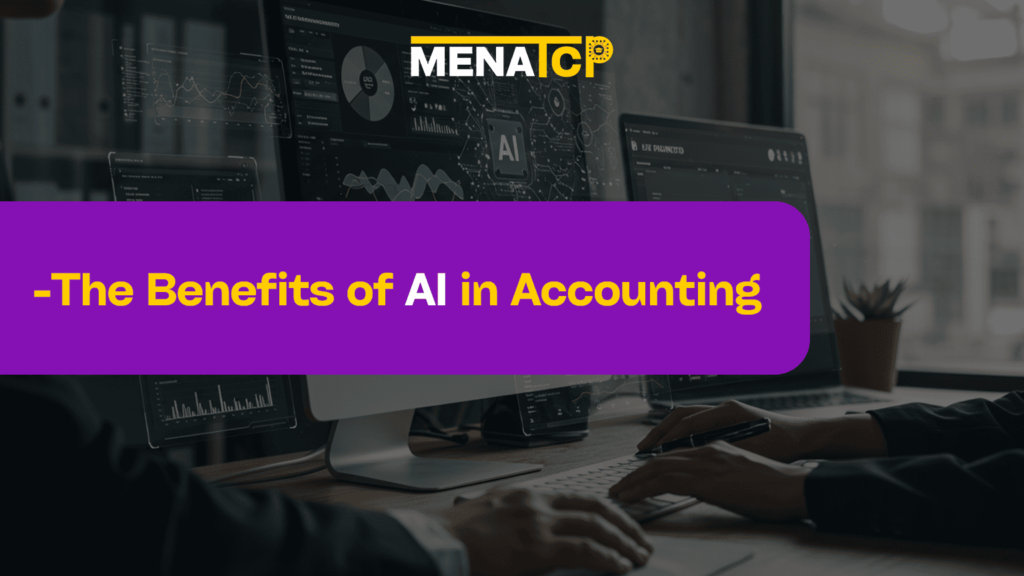Artificial intelligence (AI) is changing the game in most industries, and artificial intelligence in accounting is starting to take over and being equipped in a competitive AI market will definitely set you apart . However, instead of replacing accountants, AI is redefining their everyday roles and responsibilities.
AI can take over repetitive tasks like data entry so accountants can focus on more strategic, meaningful work. Many accounting companies are using AI to streamline operations, improve efficiency and enhance client communications.
In this blog we’ll explore the many benefits of artificial intelligence in accounting:
1- Automated data entry:
Using AI tools for accounting like cloud-based AI tools and smart integrations, data only needs to be entered once, significantly reducing human errors and increasing overall efficiency. Then, it can add that information through to all your necessary reports and working papers. It also facilitates expense tracking and can extract information from receipt images, reducing the need to get information manually. Also
AI can help financial managers track time-consuming and tedious transactions like expense tracking.
2- Non-Compliance detection:
Using AI tools for accounting can make you quickly detect non-compliance issues for your team to be one step ahead. For example, it can detect any purchases made outside of company policy. This helps auditors save time finding and assessing errors and mitigating risk.
AI can also help enforce company policies and reduce the time it takes to spot noncompliance issues in financial data.
3- Forecasting and predictive analytics:
AI can analyze historical financial data and external factors to generate accurate forecasts and predictions. Also AI helps financial organizations predict customer needs, such as cash flow demands or investment interests, enabling better customer service.
4- Real-time financial insights:
AI can process financial data in real time, allowing businesses to access up-to-date information and insights. This enables timely decision-making, Can make you act proactively when it comes to financial management, and provides the ability to respond quickly to changing market conditions or business needs.
5- Gain Insights Into Customer Behavior:
AI tools for accounting can provide valuable insights into customer behavior by analyzing past transactions or predicting future outcomes based on current market conditions.
This allows financial companies to better understand their customers’ needs and develop strategies tailored specifically for them. However, in order for a company to properly use this data companies need someone who understands business operations as a whole.
Knowing the many benefits of AI in accounting. It might come to mind that AI will eventually replace accountants but as any new technology there are concerns that might come true and others won’t Here are some ways accountants are more valuable than AI:
1- Accountants can consult:
Clients who require a consultation will definitely look for human accountants over AI. as Only human accountants are going to be able to fully understand the vision and goals of a company.
2- Accountants can incorporate AI tools:
Instead of seeing AI as a threat, accountants have an opportunity to use these tools to add to their capabilities. For example, you can use AI software to automate routine activities, allowing you to focus on higher-value tasks.
3- Accountants can learn to use complex software:
Using complex software is a skill that AI cannot offer. Although it can perform specific functions, it can’t do it alone. Moreover, a human eye is still required to ensure things are being done correctly.
In conclusion, the integration of AI in accounting is revolutionizing the industry by automating routine tasks, enhancing financial forecasting, and improving audit accuracy. By reducing errors and saving time, AI allows accountants to focus on strategic decision-making and delivering value-added services. Additionally, its role in compliance and risk management ensures organizations remain secure and adaptable in a fast-changing regulatory environment. While challenges like data security and ethical considerations persist, embracing AI responsibly can unlock unparalleled efficiency and innovation. The future of accounting lies in incorporating human expertise with AI-driven insights to drive sustainable growth and operational excellence.
